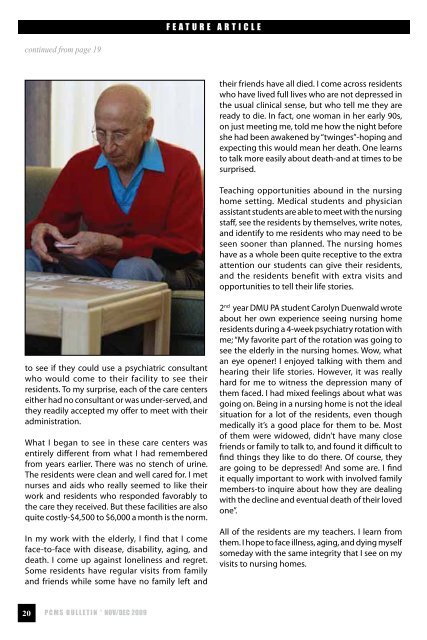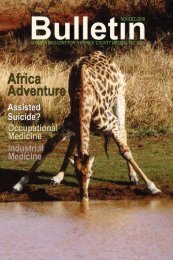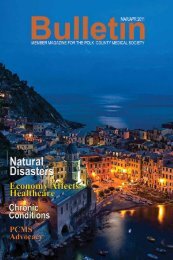PDF Version - Polk County Medical Society
PDF Version - Polk County Medical Society
PDF Version - Polk County Medical Society
You also want an ePaper? Increase the reach of your titles
YUMPU automatically turns print PDFs into web optimized ePapers that Google loves.
continued from page 19<br />
to see if they could use a psychiatric consultant<br />
who would come to their facility to see their<br />
residents. To my surprise, each of the care centers<br />
either had no consultant or was under-served, and<br />
they readily accepted my offer to meet with their<br />
administration.<br />
What I began to see in these care centers was<br />
entirely different from what I had remembered<br />
from years earlier. There was no stench of urine.<br />
The residents were clean and well cared for. I met<br />
nurses and aids who really seemed to like their<br />
work and residents who responded favorably to<br />
the care they received. But these facilities are also<br />
quite costly-$4,500 to $6,000 a month is the norm.<br />
In my work with the elderly, I find that I come<br />
face-to-face with disease, disability, aging, and<br />
death. I come up against loneliness and regret.<br />
Some residents have regular visits from family<br />
and friends while some have no family left and<br />
20<br />
P C M S B U L L E T I N * NOV/DEC 2009<br />
F E A T U R E A R T I C L E<br />
their friends have all died. I come across residents<br />
who have lived full lives who are not depressed in<br />
the usual clinical sense, but who tell me they are<br />
ready to die. In fact, one woman in her early 90s,<br />
on just meeting me, told me how the night before<br />
she had been awakened by “twinges”-hoping and<br />
expecting this would mean her death. One learns<br />
to talk more easily about death-and at times to be<br />
surprised.<br />
Teaching opportunities abound in the nursing<br />
home setting. <strong>Medical</strong> students and physician<br />
assistant students are able to meet with the nursing<br />
staff, see the residents by themselves, write notes,<br />
and identify to me residents who may need to be<br />
seen sooner than planned. The nursing homes<br />
have as a whole been quite receptive to the extra<br />
attention our students can give their residents,<br />
and the residents benefit with extra visits and<br />
opportunities to tell their life stories.<br />
2 nd year DMU PA student Carolyn Duenwald wrote<br />
about her own experience seeing nursing home<br />
residents during a 4-week psychiatry rotation with<br />
me; “My favorite part of the rotation was going to<br />
see the elderly in the nursing homes. Wow, what<br />
an eye opener! I enjoyed talking with them and<br />
hearing their life stories. However, it was really<br />
hard for me to witness the depression many of<br />
them faced. I had mixed feelings about what was<br />
going on. Being in a nursing home is not the ideal<br />
situation for a lot of the residents, even though<br />
medically it’s a good place for them to be. Most<br />
of them were widowed, didn’t have many close<br />
friends or family to talk to, and found it difficult to<br />
find things they like to do there. Of course, they<br />
are going to be depressed! And some are. I find<br />
it equally important to work with involved family<br />
members-to inquire about how they are dealing<br />
with the decline and eventual death of their loved<br />
one”.<br />
All of the residents are my teachers. I learn from<br />
them. I hope to face illness, aging, and dying myself<br />
someday with the same integrity that I see on my<br />
visits to nursing homes.






